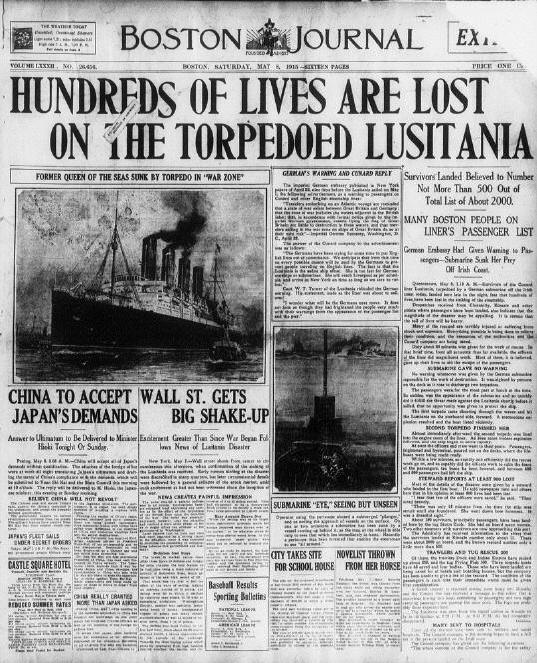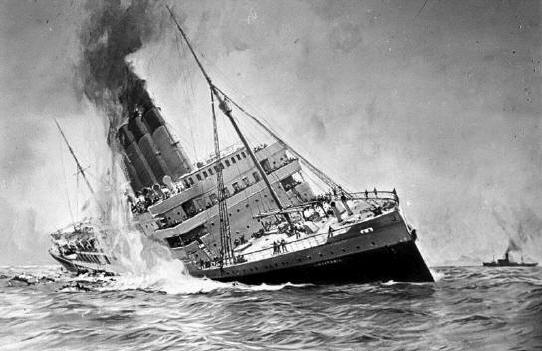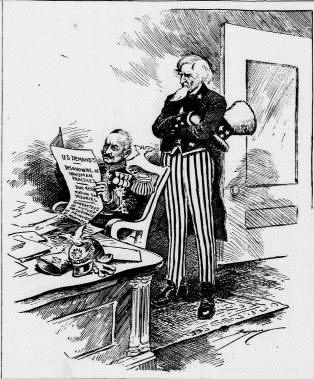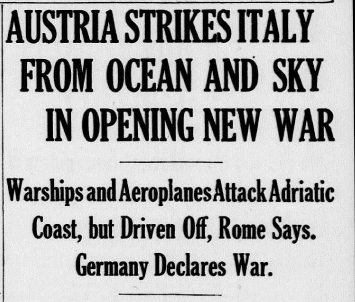May 1915
May 7
From northern Poland to the Carpathians the fighting on the eastern front has taken on a new vigor. Special attention is directed towards a new German invasion of the Russian Baltic provinces. It is generally accredited that this latest offensive movement of the Kaiser’s troops is aimed at Riga, one of the most important ports
on the Baltic. Once captured, Germany could resupply her front lines by ship and strike at the railroad running from Petrograd to Warsaw, thereby cutting off Russian communications with her armies in central and southern Poland.
The Austrians have pierced and broken the entire Russian front in West Galicia. The large Austrian-German army has been steadily concentrating before Kraków for the past three weeks with the idea of making a new offensive movement. All available Austrian troops
have been quietly transferred during this time to this new army and an unbroken stream of troop trains carrying German troops has been pouring eastward from Frankfurt, Berlin and other German railroad centers.
The Austrian offensive has succeeded with surprising rapidity. The Russians occupied naturally strong positions, which have been strengthened with every imaginable method of fortification. They felt themselves absolutely secure. But after a searching artillery preparation, exceeding an intensity anything which has occurred on
the front, the Austrians advanced. Their assault was so fierce that the Russian line broke immediately. The initial successes was extended into the heart of the wooded Carpathian section, where the Russians have been struggling for months to break through to Hungary. Once again, the Russian fortified line was pierced and the Russians were defeated
along the entire front.
The success of the Austrian-German offensive is not being won without the hardest efforts. Losses, as a result of the deadly fire on both sides are appalling. The success of the Austria-German forces has been due largely to the crushing effects of artillery. It is believed that the events on this section of the front may be a
decisive turn in the eastern campaign, that the whole Russian position in the Carpathians has now become precarious.
The political value of this victory of the first magnitude is regarded here as quite as great as the military. It comes in the midst of the Austrian-Italian negotiations to keep Italy neutral. A significant success by the Austrians in the Carpathians would give the Italians pause to think about entering the war right now.
Meanwhile, in the Dardanelles theater, the Gallipoli Peninsula is described as being gradually cut off from the mainland by the British and French forces. However, the Turks, under the guidance of their German officers, have placed every obstacle in the way of the invaders, as a result, British forces have lost heavily in the
operation.
In the western theater of the war, troops of both sides seemed willing to sit out the war and let troops on the eastern front decide its outcome.
May 14

The Cunard liner Lusitania, one of the fastest ships afloat, was torpedoed and sunk May 7 off the coast of Ireland.
Two thirds on board lost their lives. The number of passengers is given by the Canard Steamship Company as 1,254, and of a crew of 665, for a total of 1,919. The number of survivors is now counted at 703. Of the 291 1st class passengers only 76 were saved. Only 43 of the 188 Americans aboard were rescued.
When the Lusitania sailed, some nervousness was been caused because of the publication in the New York morning papers of an advertisement warning intended travelers "that a state of war existed between Germany and Great Britain and that vessels fly the flag of Great Britain would be targeted for to destruction in those waters
and that travelers sailing in the war zone on ships of Great Britain did so at their own risk."
This warning apparently did not cause many cancellations, for the ship sailed with a full passenger list. Alexander Campbell, one of the passengers who sailed on the Lusitania, referred to the advertisement as "Tommy Rot" – adding, "The Lusitania was not at risk whatsoever, as the liner had the speed of 25 1/2 knots and was
provided with unusually tight bulkheads."
Just before the steamer's departure a number of the passengers received telegrams at the pier, signed by names unknown to them and presume to be fictitious, advising them not to sail as the liner was to be torpedoed by submarines.
It will be remembered that it was the Lusitania who's flying of the American flag in February on her way from Queenstown to Liverpool in order to protect her against possible attack by a German submarine that caused a nasty exchange of diplomatic notes between Washington and London – with Washington warning that the practice
would endanger American ships.
The Lusitania was one of the largest of transatlantic liners, as well as one of the speediest. She was a product of the race for speed which was carried on for years among trans-Atlantic steamship companies. When the Lusitania was launched she was the wonder of the maritime world. Her mastery in the standpoint of speed was
undisputed.
Berlin newspapers held the sinking of the Lusitania with delight. The general impression is that England has got what it deserves. The Germans claimed that the sinking to be justifiable because the Lusitania was carry ammunition, and was classified as an auxiliary cruiser at the disposal of the British Admiralty.
The Lusitania’s lookouts sited the periscope of the submarine 1,000 yards away, and immediately thereafter saw the trail left by her torpedoes. Then came a terrific explosion as a torpedo hit the starboard side, followed almost immediately by another, which littered the deck with the wreckage. The course of the liner was at
once turned toward shore.
Survivors say that the first torpedo struck the ship near the engine-room. The second her cargo section, were it exploded an enormous amount of ammunition said by the passengers to have been stored there.
According to a passenger, Capt. Turner, after the first torpedo hit, declared that lifeboats should not be lowered as the ship was in a condition to make the Irish coast. Capt. Turner had barely finished speaking when a second explosion was heard.
According to several members of the crew, the delay in the launching of the lifeboats was due to the high speed of the vessel. They said that after the first torpedo exploded the captain gave the order for full steam ahead, and that the vessel was making 21 knots when the second torpedo severed the steam pipes from the
engines. This made it impossible to slow down the ship.
There was comparatively little panic on the Lusitania when she went down. Many of the passengers did not believe the Lusitania would sink as quickly as she did. Consequently they did not join the rush for the lifeboats, but evidently preferred to trust in their belief that the watertight compartments of the vessel would keep
her afloat until such time as help came from the Irish shore, less than 10 miles away.

Capt. Turner declared that one torpedo did all the damage, and said the second explosion, which the passengers heard, was an internal one. This idea of an internal explosion is supported by naval experts, who point out that if the torpedo had exploded on contact the steamer would have only been disabled or have one or two of
her compartments flooded. It is evident, however, they say, that if the torpedo penetrated the side and the charge of 420 pounds of explosive was detonated internally, it would have created an effect similar to the explosion of a magazine within a ship. There is little wonder, therefore, they say, that the Lusitania sank so rapidly.
An investigation has failed to reveal if the Lusitania was given warning of the proposed attack by the submarine. The first Lord of the Admiralty, Winston Spencer Churchill stated that Capt. Turner had acknowledged receipt of messages from the Admiralty giving him warning and directions he was to take. Andrew Law, leader of
the opposition in the House, asked if any answer had received from the Captain. Mr. Churchill replied that both messages have been acknowledged. The second acknowledgment came a short time before the attack was made.
According to reports from Washington, President Wilson is himself writing the American response to Germany on the sinking of the Lusitania. He is asking no help and none is volunteered. It is no longer a case of political phraseology, with a hole left open for further parlays. The president's punch in English is being applied
at this moment with a directness he has never before used in writing a great state document. He cannot command an instant reply from Germany and will not do so. He is not writing an ultimatum, but his friends can only assert that what he is writing will be direct, positive, unequivocal. It will try not to leave loopholes for a prolonged negotiation
or communication. They will have the incisive directness of straight business.
The president’s note to Germany demands a guarantee that there will be no further attacks by submarines on merchant ships carrying noncombatants. It serves notice that full reparation will be sought for loss of the American lives in the sinking of the Lusitania and for other violations of American rights in the sea zone of
war. In the event that Germany refuses reparations and does not give a guarantee to stay her hand from further outrages, diplomatic relations will be severed.
The 2,500-word note asserts the right of neutrals to travel any point on the high seas or neutral her belligerent merchantman is asserted. The note is couched in friendly tones, but is unmistakably firm. By the suggestion that the German submarine commanders must have misunderstood their instruction or that the German
government could not have intended to destroy innocent lives, room is given for a disavowal by Germany of practices in the war zone and assurance that future attacks will be prohibited.
May 22
 It is believed that the Kiser will that he will take little time in informing President Wilson that the German government has come to the conclusion that it's submarine raids have been more disastrous to life than had been intended, and that it will cease attacks upon
unarmed passenger vessels of the enemy. The Kaiser would, it is suggested, make only the condition that the United States would forbid enemy passengers vessels leaving America ports carrying arms or ammunition of any sort.
It is believed that the Kiser will that he will take little time in informing President Wilson that the German government has come to the conclusion that it's submarine raids have been more disastrous to life than had been intended, and that it will cease attacks upon
unarmed passenger vessels of the enemy. The Kaiser would, it is suggested, make only the condition that the United States would forbid enemy passengers vessels leaving America ports carrying arms or ammunition of any sort.
Germany will, it is predicted, reserve the right to continue submarine and other attacks upon freight vessels of the enemy laden with supplies of war, and will declare her purpose to redouble her energy along these lines.
The German ambassador to America is leaving no opportunity to impress upon German officials to believe that, if Germany acts quickly and wholeheartedly in her renunciation of attacks upon passenger vessels, a great counterstroke will be made in the United States and that sentiment will shift to Germany more quickly they can
now be imagined.
On the eastern front, the defeat of the Russians in Galicia has reached serious proportions. The Russians have been forced to retreat along a 200-mile line. More then 174,000 Russians have been captured during the first half of May. The victorious German armies have robbed the Russians of most of the gains of their hard winter
and early spring campaigns. As a result of the latest German tactics all that has been accomplished by the Russians in the Carpathians has been undone and months have been added to the duration of the war.
The fortress of Peremsyl, which the Austrian where forced to abandoned less then a month ago is closely threatened on two sides and is under the guns of the Austrian. It is evident that German forces will leave nothing undone in an attempt to force a crossing of the San River.
Possibly the greatest success in the past two days fighting has been gained by the Germans in northwestern Russia, where they have captured the city of Riga. Riga is Russia's principal port on the Baltic. It is important industrial commercial center, its industries being a manufacturer a machinery and railroad cars.
In the Dardanelles, it is evident that the Turks are making the Allied forces pay a fearful price on the Gallipoli Peninsula. The Turks are now said to possess an abundant supply of shells, after having been threatened for some time with a shortage. The Turks are hurrying troops and munitions to the Gallipoli Peninsula. All
siege guns and modern artillery pieces have been moved so that it may be used against the Allies.
In Armenia, 6,000 Armenians have been massacred at Van. For several weeks the positions of Armenians in Turkey have been in grave danger, but no message is conveyed any indication of such extensive massacring as does a recent report to London. If it is true, the Armenian situation has entered upon a condition, which threatens
to rival the conditions of 1895. Kurds and Turks have been persecuting the Armenian residents for several months. Many have been killed, while large numbers of women have been sold as slaves.
When the great battle now raging in northern France and in Belgium have subsided and the reckoning taken by the Allies and the Germans, it is confidently believed that the losses in dead and wounded in all other battles in the history of the world will pale in insignificance.
The conflict is going on night and day, first one side attacking, and then the other, and, in this battle, gains and losses are not measure by miles, thousands of yards or feet, but inches. French and Belgians charge, they gain a point and then lose it. The Germans advanced here and there, take a few trenches, and then lose
the trenches just gained.
Thus goes the seesawing a titanic struggle, and the game is costing tens of thousands of lives. Millions of rifle bullets sing through the air during the entire day. So fast are the huge missiles of death fired by allies and Germans that it seems the heavens are sounding a warning with perpetual peels of thunder.
May 28
 On May 24, Italy declared war on Austria. News of the declaration was not unexpected after the two sides broke off talks aimed at keeping Italy neutral. In response, Germany has declared war on Italy
On May 24, Italy declared war on Austria. News of the declaration was not unexpected after the two sides broke off talks aimed at keeping Italy neutral. In response, Germany has declared war on Italy
There is confidence in Italian quarters that if Romania, as has been the understanding for some time, follows Italy's led, she need not fear an attack by Bulgaria. Details of the possible alignment of the Balkan states are lacking, because it is understood negotiations are constantly in progress relative to whose side in the
war, Romania, Bulgaria and Greece will take, and the situation, consequently, is likely to change from day-to-day.
Italy's first move on land undoubtedly will be against the Austrian frontier. Large numbers of her troops were mobilized in this territory, and the forces of Austria are lined up on the other side of the boundary. The very mountain character of the territory where the opposing armies face each other, the southern part of the
Austrian Alps, promises operations and fighting of the most difficult nature. For several weeks passed both the Austrian and Italian armies have been engaged in fortifying and otherwise adopting protective measures each on its own side of the dividing line.
It is understood that the Germans and Austrians have concentrated approximately 530,000 men on the Italian frontier. They have occupied strategic positions in order to be an attack were to attend to strike the first heavy blow in endeavor to dishearten the new combatants at the beginning of the campaign. All told there are 1
million men facing each other across the Italian and Austrian border
In other war news, a dispatch received from Berlin states that the German government has promised Washington to respect the American flag on ships. Germany also agreed, it is stated, that it ships belonging to the Allies were to be torpedoed, notice will be given to the passengers and crew before the ships were sunk. This
order was issued to the commanders of all German submarines.
The terrible effectiveness of the German submarine warfare on merchant shipping around the British Isles is being brought home in force to the British as they continuing torpedo steamers almost daily operating in an out of English ports. The submarine menace is of growing one, both in the Aegean Sea as well as in British home
waters. Submarines promise to take an active part in Italian and Austrian naval engagements in the narrow waters of the Adriatic where numerous inlets offer great shelter for the boats.
On the eastern front, out of breath after the eastward spurt, the Germans and Austrians are now bringing up reinforcements and fresh ammunition, and another great battle we fought to determine whether the new lines to which the Russians have fallen back are tenable.
The main struggle is being carried along the River San, from Peremysl northwards for a distance of about 60 miles. The firing of between 2 and 3 million Austrian and German shells on the comparatively short front gives some idea of the extreme violence of the operations. The Germans are said to have crowded 4,600 field guns in
the closest formation ever seen in the battle. Being three times the normal number of guns for such an extent of territory.
In the Dardanelles, Turkish casualties in the desperate attacks upon Australian and New Zealand troops the night of May 18 and 19th were more than 7,000, fully 2,000 were killed. Allied losses were no more than 500.
In fighting on the western front reports have been received of a German gas attack that was greater than any previous occasion. The attack was over front 5 miles wide. The gas was admitted from cylinders while at the same time the French lines were bombarded with Asphyxiating shells. The gas cloud rose in places 40 feet high
from the ground. It is also reported the Germans using asphyxiating gas in another attach, succeed in penetrating British lines at two points, but quickly lost them once the gas evaporated.
Although there is nothing confirmatory reports from the front say the Germans on the West front are preparing to withdraw to their second line, and thereby shortened their front which would enable them to release troops for use against Italy.
Read past editions of News Reports From the Front
Have a newspaper clipping on a event that took place in Emmitsburg?
If so, send it to us at history@emmitsburg.net